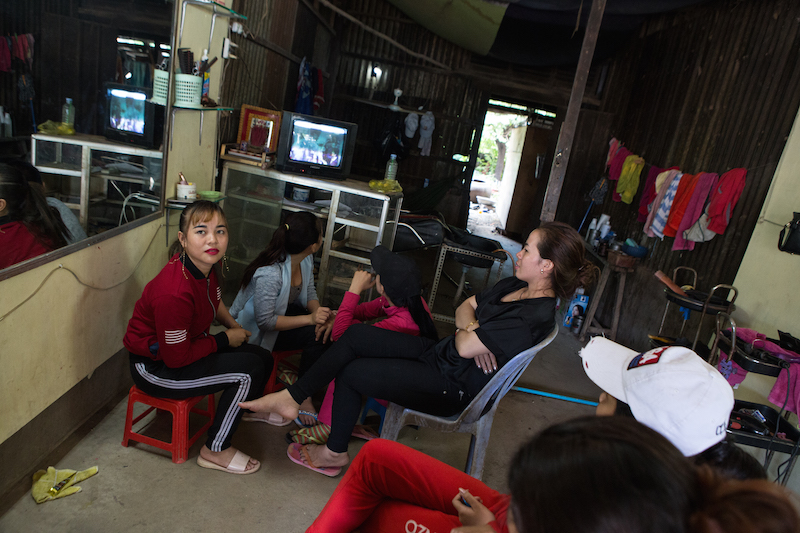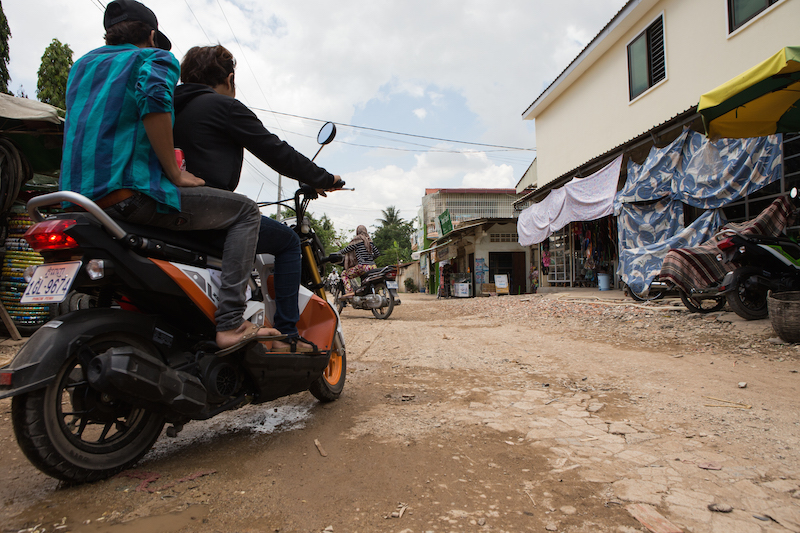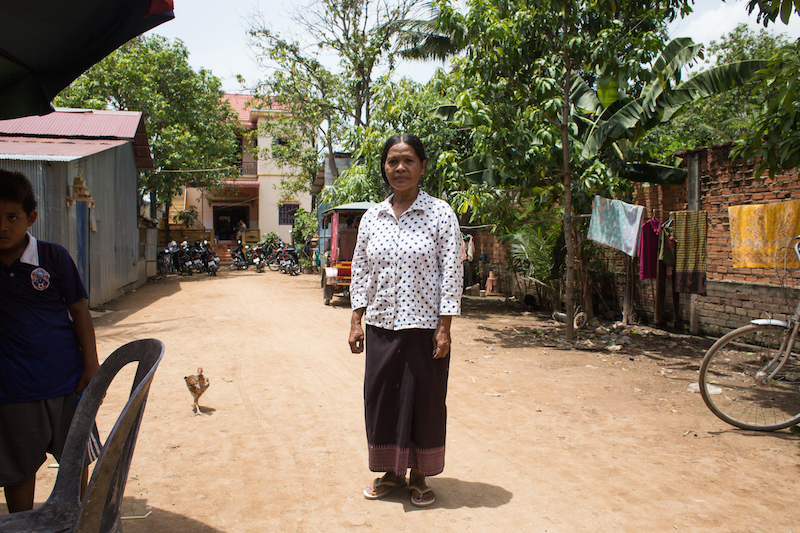Villagers of Akrei Khsat commune in Kandal province’s Lvea Em district say drug crime in the area has almost reached crisis point.
Hun Somany, 39, said her ex-husband had been in and out of prison over drug trafficking charges for years, though she didn’t know the exact details of his alleged crimes. A year ago she divorced him after he was released from his third stint in jail, finally convinced that he was involved in the drug trade, she said.

Her neighbor, 61-year-old Ly Cheng, also has a family member potentially facing years in prison for drugs. She said her 27-year-old son was currently awaiting trial for trafficking after being arrested in March. She had no idea that her son had been involved with drugs.
She had heard from many other villagers that their children also started using drugs, she said. “More and more people are using,” she said.
The perception of rampant drug abuse in communities has become widespread in Cambodia. According to a public survey leaked to reporters over the weekend—apparently commissioned by the ruling CPP—respondents last year ranked drugs and crime as the most important issue in Cambodia that the government should be doing more about, trumping agricultural prices, employment and prosperity, and corruption.
The fears are growing alongside a major increase in drug busts countrywide. A recent U.N. report on the drug trade in Southeast Asia says drug-related arrests in Cambodia increased “approximately eighteen-fold,” from 394 people in 2008 to 7,008 in 2015.
A further 7,753 users received drug abuse-related treatment in 2015, says the report, “The Challenge of Synthetic Drugs in East and South-East Asia,” published this month by the U.N. Office on Drugs and Crime.
It says drug use and trafficking—particularly of methamphetamine, but also of heroin—is a growing problem in the country.
Ou Virak, who heads the Future Forum think tank, said his previous work for the Cambodian Center for Human Rights had given him broad access to public opinion.

“I used to drive around the country for public forums and the No. 1 issue was always security,” he said, referring to drugs and crime. He added that the concern was shared “across both rural and urban settings.”
“I’ve been saying all along that this would be a major issue,” he said.
In Akrei Khsat, from where the tops of Phnom Penh’s high-rises are visible across the Tonle Sap river, fears of a drug crisis appear to have become a decisive political issue.
Phon Sanna, a 38-year-old hairdresser, said she had the issue in mind when she cast her ballot in the June 4 commune elections.
“People using drugs can affect social security,” she said.
Another villager, 23-year-old store owner Kaun Kunty, said the issue was part of the reason why she had “voted for change.”
According to the National Election Committee’s preliminary results, the commune swung sharply from the CPP to the CNRP on June 4.
In 2012, the ruling party received 65 percent of the vote; this year it won just 47 percent. The CNRP took the commune with a margin of more than 200 votes, out of about 5,500 cast.
Incoming CNRP commune chief Touch Savuth said many villagers had come to her to voice their concerns about drug crime leading up to the elections.
“The concern about drug crime is very high, because the problem is growing,” she said.
Ms. Savuth said she planned to hold “counseling” meetings between drug users and local authorities once she was officially in office, though she said no trained counselors would be present at the sessions.
She added that police officers should eventually have their salaries raised, and individual officers should receive a bonus payment for major drug busts.
“If we give them more money they will focus on their job,” she said.

Several villagers told reporters that authorities had demanded bribes after arresting alleged traffickers and users in order to secure their release.
The outgoing CPP commune chief, Koch Chan, said he had also observed drug crime steadily increasing over the years, especially during his last mandate. He said authorities had done all they could, and blamed outsiders for bringing drugs into his commune.
“The authorities try to crack down on drug traffickers and users very often, but it is like [trying to] move away water weeds,” he said.
Ann Penh, the commune’s police chief, said authorities “crack down every day” on drug crimes, and as a result, he said, the problem was going away.
A similar swing toward the opposition was also seen in Phnom Penh’s Toek Thla commune, the site of the notorious Trapaing Chhouk village slum.
The “drug village” was heavily targeted by the government’s high-profile anti-drug campaign that started in January. Authorities knocked down almost 100 drug dens over 25 days and arrested hundreds of drug users, and claimed drug crime had been completely eradicated from the village.
Toek Thla voted 62 percent for the CPP in 2012. On June 4, only 38 percent voted for the ruling party, handing the CNRP the commune by a margin of almost 4,000 out of 16,000 votes.
Nationwide, authorities have arrested more than 8,000 people for drug-related crimes so far this year. Many of those arrested have been alleged drug users.
Political analyst Cham Bunthet said he was not surprised that drug crime had been a hot topic for voters.
“I think drug trafficking is the most popular issue in Cambodian society—no doubt about it,” said Mr. Bunthet, who is an adviser to the fledgling Grassroots Democracy Party.
But both major parties had failed to properly discuss the issue with voters during campaign season, he said, instead using negative campaigning or vague election promises.
The parties “use a lot of propaganda politics; they don’t go through the problems carefully and talk about them in detail with a potential agenda for them to fix and how,” Mr. Bunthet said.
Mr. Virak, of Future Forum, agreed.
“I’m surprised that they’re not paying attention—I’m not surprised that they’re not strategic, but I’m surprised that they don’t do more,” he said.
“Raising salaries is not a policy,” he said. “What I want is a real policy—how you’re going to do it, why it would work, what I’m expecting to see. Telling me numbers is not going to do it,” he said, referring to the CNRP’s pledge to give a budget of $500,000 to every commune if elected in the national election next year.
Public debate on drug policies was nonexistent, but badly needed, he said.
“It’s upsetting. Cambodia should have gone the right way in the 1990s, but it hasn’t really in this area,” he said, adding that decriminalizing drugs should be considered a serious option.
“We’re actually in a better position to discuss this. We should do that,” he said.
None of the villagers that reporters spoke to in Akrei Khsat commune could name a single drug-related policy from either of the major parties.
CPP spokesman Sok Eysan said the government was succeeding in its anti-drug campaign “because thousands of cases of drug crimes had been cracked down on.”
Mr. Eysan said his party had promoted its drug policies during campaign season, including educational programs as well as a “village to commune” network that would see drug users named to authorities by villagers.
He added that people who were informed about drugs would not take them.
CNRP spokesman Yim Sovann said more resources would be provided to commune police under a potential CNRP government, while education at a community level was also key to combating widespread drug abuse.
During the campaign period the party “had to give a short message. When coming into implementation, we have to go into detail,” Mr. Sovann said.
“We have to educate the people, invite the people to come to the meetings and tell them how to protect their children from drugs, and how to educate their children about drugs,” he said.
Sou Sochenda, a manager at Khana, an NGO that supports voluntary drug treatment programs, said she had heard most parties propose vague anti-drug policies leading up to the elections, with unfeasible objectives.
She said the government should pay more attention to “evidence-based drug treatment and big organized crimes rather than criminalizing drug users” and dismissed the idea of wiping out drugs completely.
“I heard about this unachievable goal during the commune election campaign,” she said.
“It’s unrealistic to eliminate illegal drugs in the country.”



